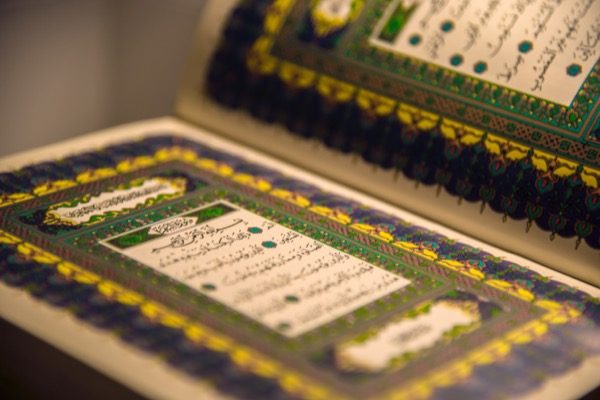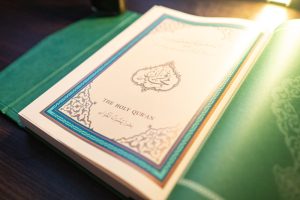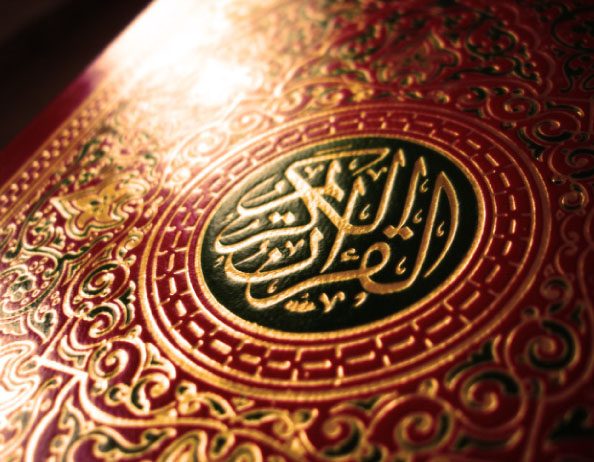
© Shutterstock
We proudly present the first full English translation of the commentary of Chapter 113, Sūrah al-Falaq, by Hazrat Mirza Bashiruddin Mahmud Ahmad (ra) in his magnum opus: Al-Tafsīr Al-Kabīr – The Grand Exegesis.
In the previous edition we looked at the lexical analysis of the word Ghāsiq.
In this edition, commentary of verse 4 of Sūrah al-Falaq begins.
Translated by Murtaza Ahmad
Edited by The Review of Religions Translation Team.
It has previously been explained in the commentary of قُلْ أَعُوذُ بِرَبِّ الْفَلَقِ * مِنْ شَرِّ مَا خَلَقَ (Qul A‘ūdhu bi Rabb al-Falaq min Sharr mā Khalaq) that these verses prophesise that the victory of Islam which began in the epoch of the Holy Prophet Muhammad (sa) will indeed come and that God will bestow all manner of blessings upon the Muslims.
Further, Muslims are instructed on the one hand, to pray that this promised victory is granted to them swiftly, and on the other hand, to seek refuge with Allah Almighty from the misfortunes that befall the rulers of nations, and not to indulge themselves in opulence and luxury because of an abundance of wealth, or fight among themselves for the sake of glory and prestige.
Following these verses, Allah Almighty goes on to say وَمِنْ شَرِّ غَاسِقٍ إِذَا وَقَبَ (wa min Sharr Ghāsiq idhā Waqab) That is, ‘I seek refuge from the evil of غَاسِق (Ghāsiq) when it overspreads.’ As mentioned in the lexical analysis [see the April 2024 edition], the term Ghāsiq means night and وَقَبَ (Waqaba)signifies the spread of darkness. Similarly, the word Ghāsiq means the sun, while وَقَبَ implies the disappearance of something. Thus, considering these meanings, it can be inferred from وَمِنْ شَرِّ غَاسِقٍ إِذَا وَقَبَ that ‘I seek refuge from the evil of the time when the sun sets and complete darkness overspreads.’
Allah Almighty states in Sūrah al-Aḥzāb (Chapter 33) of the Holy Qur’ān that:
يَا أَيُّهَا النَّبِيُّ إِنَّا أَرْسَلْنَاكَ شَاهِدًا وَمُبَشِّرًا وَنَذِيرًا * وَدَاعِيًا إِلَى اللَّهِ بِإِذْنِهِ وَسِرَاجًا مُنِيرًا
That is, ‘O Prophet! We have sent you as a role model for the people, a bearer of glad-tidings of prosperity for the believers, and a warner of the news of punishment for the disbelievers. Moreover, by the command of Allah Almighty, [you are made] to call people to Him and to be the sun that illuminates the world.’ [1]
The Holy Prophet Muhammad (sa) is referred to as the radiant sun in these verses, and it has been foretold that his light will illuminate the entire world. Allah Almighty has indicated to the Holy Prophet Muhammad (sa) in the following words of Sūrah al-Falaq:
قُلْ أَعُوذُ بِرَبِّ الْفَلَقِ * مِنْ شَرِّ مَا خَلَقَ that it has been decreed for the teachings he has brought to spread throughout the world and that the Holy Prophet (sa) will shine brightly like the sun at its zenith, illuminating the entire planet. The Holy Prophet (sa) is then instructed to beseech Allah Almighty’s protection in these words: وَمِنْ شَرِّ غَاسِقٍ إِذَا وَقَبَ, lest a time come when the Holy Prophet’s (sa) radiant countenance is hidden from the world, thus depriving people of his light, and darkness engulfs it. In a similar vein, every member of the Muslim Ummah is instructed to continue to pray for protection so that Allah Almighty may prevent them from facing decline after attaining all the accomplishments and the spiritual and material progress that He would bestow upon them through the Holy Prophet Muḥammadsa. Further, it should not be the case that they ever forsake practising the Holy Qur’ān’s teachings, thereby depriving themselves of the light and radiance of the Holy Prophet (sa) and the Holy Qur’ān, and that darkness prevails over them.
Likewise, after material progress has been achieved, it should not be that a circumstance arises that causes the Muslims to fall into the pitfalls of ruin, and if, on account of their own mistakes, such circumstances do arise, may Allah Almighty Himself come to their aid, and may He bring about such circumstances for the world to witness the radiant countenance of the Holy Prophet (sa), so that the days of decline turn into days of prosperity once more.
2) One of the meanings of the word غَسَقَ (Ghasaqa) is the abundance of something. Thus, one infers from the expression غَسَقَتِ السَّماءُ غَسْقًا…أَيْ اِنْصَبَّتْ وأَرَشَّتْ (Ghasaqat al-Samā’ Ghasqan…ai Inṣabbat wa Arashshat) that there was so much water in the clouds that it began to rain heavily. Similarly, the term غَسَقَ is also used when eyes are filled with tears which begin to flow themselves. Considering these meanings, وَمِنْ شَرِّ غَاسِقٍ إِذَا وَقَبَ would mean: ‘I seek refuge [with Allah] from experiencing hardship after comfort and prosperity.’ It is clear that an excess of wealth at times leads one to ruin, whereas at times poverty can have the same effect. For instance, it is observed that sometimes the light’s intensity damages the eyes, and at times the eyes are damaged due to the lack of light; not only do those who stare at the sun lose their eyesight, but also those who live in darkness. Peace and comfort cannot be attained until one adopts the path of moderation. Thus, we learn from the expression مِنْ شَرِّ مَا خَلَقَ (min Sharr mā Khalaq) a prayer to safeguard ourselves against excess wealth and its harms, while the words:
وَمِنْ شَرِّ غَاسِقٍ إِذَا وَقَبَ indicate being safeguarded against the dangers of having too little wealth, which is a dangerous plight to be in, as expressed by the ḥadīth:
كَادَ الْفَقْرُ أَنْ يَكُوْنَ كُفْرًا
(Kāda al-Faqr an Yakūn Kufran)
This means that sometimes poverty causes one to lose their faith. As a safeguard against such circumstances Allah Almighty has taught us to pray that we should beseech Allah Almighty so that after acquiring wealth, a time of poverty may not come upon us. Those who are poor right from the start may not feel [the extent of] their poverty, but for those who face poverty after being wealthy, every passing day becomes more difficult. Thus, in order to be protected against such circumstances we have been taught the prayer:
وَمِنْ شَرِّ غَاسِقٍ إِذَا وَقَبَ
3) غَاسِقٌ refers to both the sun and the moon. One of the meanings of the word وُقُوْب (Wuqūb) is an eclipse. Thus, وَمِنْ شَرِّ غَاسِقٍ إِذَا وَقَبَ would mean ‘I seek refuge with Allah against the evil of the time of solar and lunar eclipses.’
The eclipse of the sun and moon has twofold significance:
a) The divine light that is necessary for the progress of man would become dim and the things which utilise this light would no longer be able to acquire it. For instance, the sun produces its own light, whereas the moon draws its light from the sun and illuminates the world. If such circumstances were to arise in which the moon was unable to draw light from the sun and it became dark, then such a situation would also fall under the verse: وَمِنْ شَرِّ غَاسِقٍ إِذَا وَقَبَ. Although this verse constitutes a prayer, it also contains a prophecy with respect to a time in which even the light of the Holy Prophet (sa) would be hidden from the world, and not only would people be unable to perceive his light, but there would also remain no righteous individual or saint among them who occupies the status of ‘the moon’ [in relation to the Holy Prophet (sa)], to draw from his light and disseminate it throughout the world. In fact, only darkness would prevail. It has been instructed that at such a time, one should seek refuge against the evils that may be inflicted on the Muslim Ummah.
b) The eclipse may also be taken here in the literal sense, i.e. this verse refers to the eclipse of the sun and the moon, and Allah instructs us that when such a time comes upon us, we ought to seek refuge with Him against the harms thereof.
It is clearly stated in the aḥādīth that after the Ummah of Muḥammad (sa) has attained spiritual and material progress, a time will come when it will fall into a pit of moral degeneration. There would be nothing left of Islam among them except its name and nothing would remain of the Holy Qur’ān except its script and nobody would act upon it. All sorts of vices would spread among them, and the rule and grandeur they had gained through the blessings of the Holy Qur’ān would come to an end. At such a time, Allah Almighty would aid the Ummah of Muḥammad (sa) and commission a person who would be named the Messiah and Mahdī, and through him, Islam would prevail in every way and its once-effaced glory would be restored in the world. There will be many signs for the advent of the Mahdī and Messiah. Among those signs are the solar and lunar eclipses during the month of Ramaḍān.
إِنَّ لَمَهْدِيِّنَا آيَتَيْنِ لَمْ تَكُونَا مُنْذُ خَلَقَ اللَّهُ السَّمَاوَاتِ وَالْأَرْضَ , يَنْکَسِفُ الْقَمَرُ لِأَوَّلِ لَيْلَةٍ مِنْ رَمَضَانَ , وَتَنْكَسِفُ الشَّمْسُ فِي النِّصْفِ مِنْهُ
That is to say, when our Mahdī is sent to establish the greatness of the religion of Islam, at that time, two signs will appear as evidence for his claim that have never occurred before as proof for any other claimant. First, the moon will be eclipsed on the first night in Ramaḍān, i.e. on the first of the nights on which a lunar eclipse can occur, and within the same month, the sun will be eclipsed on the middle day, i.e. on which a solar eclipse can occur.[2]
This ḥadīth mentions a specific prophecy regarding the solar and lunar eclipses, and accordingly, Allah Almighty has taught us a prayer in the words: وَمِنْ شَرِّ غَاسِقٍ إِذَا وَقَبَ that when Islam is in a weak state, and when God Almighty appoints the Messiah and the Mahdī to consolidate the greatness and glory of Islam again, we call on Allah Almighty to protect us from the evil that will come at that time, to include us among his helpers and supporters, and to safeguard us from the punishment that befalls his opponents.
Serialisation of Sūrah al-Falaq will continue in the next edition.
ENDNOTES
1. The Holy Qur’ān, 33:46-47.
2. Sunan al-Dāraqutnī, Kitāb al-‘Idain, Bāb Ṣifat al-Kusūf wa al-Khusūf.




Add Comment